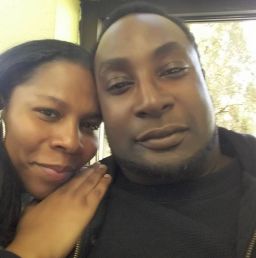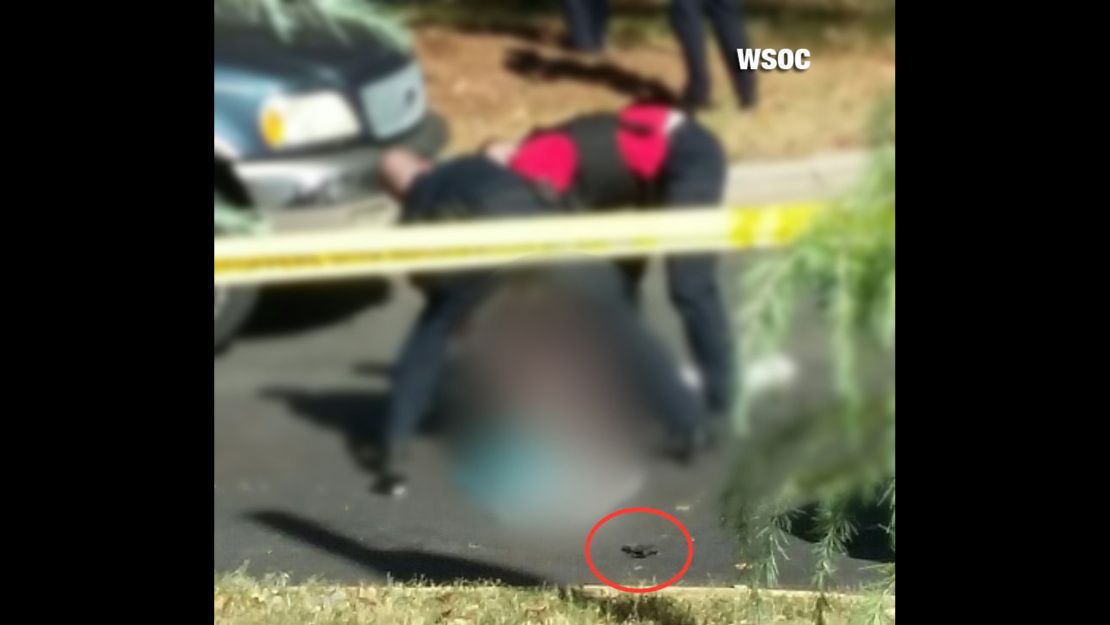Story highlights
NEW: Police chief says he now favors releasing police video of shooting
NEW: Family releases cell phone video of Keith Lamont Scott's shooting
This time, the protest had more handshakes and hugs than looting and fires.
On Thursday, protesters marched in Charlotte for a third night over the fatal police shooting of Keith Lamont Scott – remaining largely peaceful as they made their way down the streets.
Although the city had announced a curfew would go into effect after midnight early Friday, police did not force protesters to leave.
While mostly peaceful, a far cry from the previous two nights, throngs of protesters expressed their outrage over Scott’s death by circling the police department and the city jail.
They raised their hands to signify “don’t shoot” and lay down on the ground as if they’d been shot.
Three people were arrested Thursday night, and four law enforcement members sustained minor injuries.
‘We let things get out of hand’
Violence rocked the previous two nights, leaving one man dead after police said a civilian shot him during Wednesday’s protest.
“A lot of community leaders were out there the entire time to keep it peaceful,” said Tyler Hickey, a University of North Carolina at Charlotte student who attended the protests.

“This is the right way to do it. Last night, we messed up. We let things get out of hand. But tonight, we were going to show the world that this is how we come together to protest.”
Some protesters hugged National Guard members, shook their hands or took pictures with them. Antonique Alexander went a step further, pinning a flower on a police officer’s lapel.
“I drove back to support my city. My city needed me,” said Alexander, 21, a senior at UNC Greensboro.
The night didn’t go entirely without incident.
Protesters briefly tried to block a highway, but were quickly met by tear gas and dispersed. Charlotte-Mecklenburg police said two officers were treated after protesters sprayed them with a chemical agent. It was unclear what agent was used.
At the beginning of the night, protesters held a vigil for Justin Carr, 26, the man shot during Wednesday’s protests. They stood at the corner where he was shot and prayed for him. Police announced Friday that Rayquan Borum has been arrested on suspicion of murder in Carr’s death.
The shooting
Central to the protests are the differing accountsbetween police and Scott’s family over what led to his death Tuesday. Authorities said a black police officer fatally shot Scott, a black man and a father of seven, in an apartment complex parking lot as officers looked for another man named in a warrant they were trying to serve.

Police said Scott had a gun as he exited his vehicle, and that Officer Brentley Vinson shot him after Scott did not comply with officers’ commands to drop the weapon.
Scott’s family has said he was reading a book and waiting for his son to come home from school when the shooting happened. But police said Scott was armed and no book was found at the scene.
Also in contention are two police videos – from a dashboard camera and an officer’s body camera – that show Scott’s death. Police allowed Scott’s family to view the videos Wednesday but have so far declined to release the footage to the public.
The family says the videos do not show what was in Scott’s hands when he was shot.
On Friday, Scott’s family released what it says is a separate cell phone video, recorded by his wife, that shows the moments leading up to his fatal shooting.
“Don’t shoot him. He has no weapon,” the woman recording can be heard saying. “He doesn’t have a gun. He has a TBI. He’s not going to do anything to you guys. He just took his medicine.”
TBI is an acronym for traumatic brain injury.
‘We want the tape!’
Protesters Thursday night chanted “We want the tape!” and questioned why the public couldn’t see the police footage. Some perceived it as lacking transparency, fueling widespread anger in Charlotte.

“The main demand was we want more transparency,” said Hickey, who attended all three nights of the protest. “We understand that not all police officers are bad, not all police officers did the wrong thing.”
Alex Orange, 26, spent the night holding a mirror in his hand toward the Charlotte-Mecklenburg Police Department.
“Some people do a lot of bad, and sometimes you need to see your reflection in the mirror,” he said.
Like many protesters, Orange said he believes Scott was wrongfully killed. But he said he’s willing to change his mind if police footage shows the shooting was justified.
Full coverage: Charlotte protests
The problem is, the public can’t see the footage.
“Why are they keeping the video?” he asked. “That would help us know what’s going on.”
Charlotte-Mecklenberg police Chief Kerr Putney said Friday he favors releasing the videos, but only when enough information is gathered so that the footage can be part of a package so that the incident “can be fully understood.”
That’s an apparent change from what Putney said Thursday when he indicated he had no plans to release the video, saying he doesn’t want to jeopardize the investigation.
What the videos show
The dashboard and body camera video does not provide “definitive visual evidence” that Scott pointed a gun at police officers, including Vinson, who shot him, the police chief said.

The family said the video showed Scott acting calmly and nonaggressively Tuesday, the day he was shot. Scott didn’t own a gun or habitually carry a gun, family attorney Justin Bamberg said.
“When he was shot and killed, Mr. Scott’s hands were by his side, and he was slowly walking backward,” he said.
Charlotte Mayor Jennifer Roberts told CNN’s Anderson Cooper that the videos did not provide “a very clear picture.”
“The gun in question is a small gun, and it was not easy to see with the way the motion was happening,” she said
The family wants police to release the videos immediately to the public, Bamberg said.
North Carolina recently passed a law that blocks the release of police recordings from body or dashboard cameras with limited exceptions. That law is set to take effect in October.
Roberts said an attorney for the city told her that the law will not affect decisions about whether to release the videos in Scott’s killing, because the law was not in effect when the shooting happened.
North Carolina law blocks release of police recordings
CNN’s Ed Lavandera, Jason Hanna, Eliott C. McLaughlin, Boris Sanchez and Brian Todd contributed to this report.


















